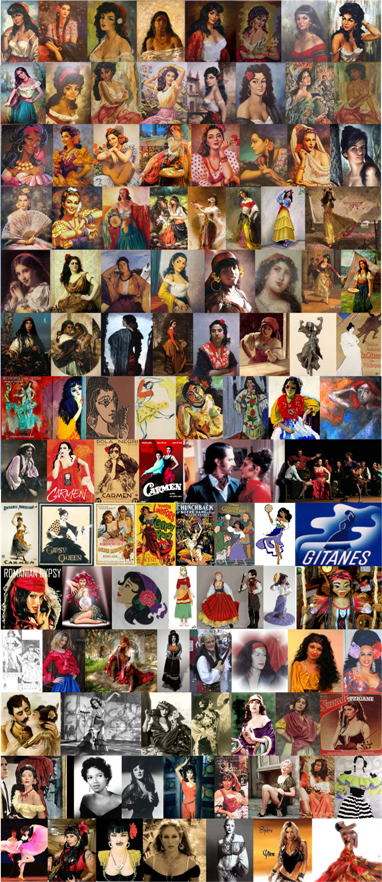CARMEN von Lidija Mirkovic
Such like Shakespeare’s Shylock became an object of anti-Semitic projection during the centuries, the world’s most played opera CARMEN provides a lot of opportunities for imagination of antiziganism and formes notion on Gypsies since its creation.
In fictional movies the directors deal with the
subject Carmen
since 1907. There are at least 30
Carmen film versions by directors such as Cecil B. DeMille, Charlie
Chaplin, Ernst Lubitsch, Otto Preminger, Jean-Luc Goddard and Carlos
Saura.
Both the version of Mérimée and the opera of Bizet provide many chances for interpretation of the matter due to their symbolic and mythic levels of this subject. But in the always possible version the content flattens out to a stereotype, which allows for tawdry exotism, in production of opera, in fictional movies and in arts.
The ability of serial production in conjunction with
the
industrialisation evolved “department store” arts
which are
bound to prettify the middle-class living room. This consumer pictures
– produced in commercial process for the great mass
– are
directed to forming collective notion. Often you can observe in this
tawdry illustrations the sup-posedly lifeworld of gypsies, while
prejudices and romantic projections of the mainstream society are
portrayed. Effusive image subjects are the favourites like
covered cart at the camp fire
, the violinist, the
dancing
girl, the fortune teller and of course Carmen.
Carmen is a widespread image subject: the black
haired gypsy
woman
with large ear rings, low neckline and a promising look – the
opposite of the subdued hose wife. This illustration of the gypsy women
is the mostly imprinting Imago of the European culture and
literature
, stated Almut Hill in her book on the gypsy woman
in
the German-language literature. In the middle-class version Carmen is
the unsubdued, freedom-loving woman who flirts with the men
self-confidently and self-determined, a femme fatale who personified
the everlasting femaleness. A sensual, wild creature of the nature.
Considering the social class the gypsies belonging
to
predominantly
all existing myths are disenchanted, even the one of
Carmen
as eternal seductress. On this reading the
figure
Carmen
can be interpreted as prostitute already
at Bizet,
which comes closer to the social reality of the gypsy women today as
well as during Bizet's lifetime.
